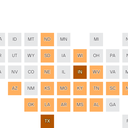Red states crack down on abortion pills

As the U.S. Supreme Court signals a potential end to Roe v. Wade, abortion rights activists are heralding abortion pills as a potential option in places where clinics may have to close — but several red states are already cracking down on the pills.
The big picture: Almost half of U.S. states have banned or tightly restricted abortion pills — two medicines named mifepristone and misoprostol — and more could soon follow suit.
- Prior to the pandemic, the FDA said patients seeking abortion pills had to get the drug from hospitals or medical facilities in person.
- In April, the Biden administration lifted that requirement, opening up access through telemedicine. The FDA is expected to decide next week whether that option will remain in place.
Driving the news: A new Texas law went into effect last week that completely bans the use of abortion pills after seven weeks of pregnancy.
- Indiana bans the pills after 10 weeks. So do Oklahoma and Montana, though the courts have blocked those laws.
- The Wyoming state Senate passed a bill in March aimed at completely outlawing abortion pills.
- In Iowa and Ohio, laws require a physician to be present when a patient takes the medication. However, federal judges blocked those laws , saying the requirement places an "undue burden" on women.
What they're saying: "I think pretty much any state that is on the conservative side might expect to see similar legislation in 2022," Elizabeth Nash, state policy expert at the Guttmacher Institute, told Axios.
What's next: Some activists have been pointing to newer options that skirt certain telemedicine restrictions and operate in a legal gray area, including one online medication abortion provider, Aid Access, founded by a Dutch physician in 2018, which will mail abortion pills internationally.
- Abortion rights advocates say people who want to end a pregnancy will use abortion pills no matter what the policy landscape is.
- "It is going to be in their hands in the U.S., it's inevitable," said Elisa Wells, co-founder of Plan C, which provides information on how to access abortion pills online. "This is modern medical technology everybody should have access to. Whether people can use it under the radar without being criminalized is the question."
The other side: "Pro-life groups are encouraging states to take action to install safeguards for women that will ensure they are aware of the risks when undergoing a chemical abortion," said Prudence Robinson, a communications associate at Susan B. Anthony List, an anti-abortion advocacy group.
- "And the states are facing this threat head on. In this year alone, nearly 10 states enacted state-level restrictions on this dangerous method of abortion."
Of note: South Dakota is the only state that prohibits the mailing of abortion pills via executive order instead of legislation. Gov. Kristi Noem (R) directed the state's health department to set up a rule banning telemedicine for the pills.
- "This is where states might try to go, and a new process states might impose," Nash said.